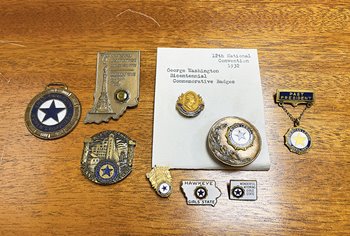What to do with all of those ALA keepsakes
You love being a member of the American Legion Auxiliary and have many ALA-related items you’ve collected over the years. You may have national and department president pins, branded jewelry, scrapbooks, photos, and other memorabilia. They have sentimental value to you, and you want them to end up in good hands after you decide to downsize your home, or you pass away.
 Will a family member want any of those ALA belongings? Will other members be interested? Where should you donate?
Will a family member want any of those ALA belongings? Will other members be interested? Where should you donate?
Often, collections end up in estate sales, antique shops, auction sites like eBay, or are donated to thrift stores like Goodwill.
However, with a little planning, you can arrange where these keepsakes will go. Think of them in the same way you would with the rest of your estate.
This makes it easier for loved ones and prevents items from being dropped off at a unit or department with no notice and no one knows what to do with everything or has the time to go through the items.
Start by taking an inventory of what you have, and make a list. It’s also a good idea to take photos of the items. This is helpful if you are communicating through email with someone who may be interested in a donation.
Ask your family, friends, and fellow ALA members if they are interested in any of the items. Next, ask your unit and department. Your unit may be interested in photos or scrapbooks. Even news articles may be of interest because they may contain information that is not in the history books. Some departments have a history museum and may like a few items for their collection.
You can also ask local historical societies or libraries. Historical societies often take donations that help preserve the history of organizations in the community. For example, meeting minutes may not sound exciting, but they may contain information about what was happening in the community at that time. Another place to ask is your college alma mater.
If you are donating someone else’s items, the suggestions remain the same. A good starting point is to contact the unit the member belonged to. Also, it’s helpful if you know whether the person was an officer and at what level. This will guide you on who’s interested in the items. For example, ALA National Headquarters has interest in items pertaining to the national history of the organization. This doesn’t mean NHQ can take everything, but it never hurts to ask. Keep in mind, photos and news articles are more important than you may think. The pictures may not have been seen before at the national level, or news articles can give a historian more details about a project or event.
What to do with donated ALA items
As important as it is for a member to be prepared, it’s important for units to be prepared to receive these donations. As a unit takes in new items, there should be a plan to catalog the items. Cathi Taylor, American Legion Auxiliary National Headquarters’ archivist, suggests keeping an inventory.
“The cheapest way for members to keep a catalog of what they have is to use an Excel spreadsheet,” Taylor said. “They can take photos of the object and embed them into an Excel spreadsheet.” Taylor suggests keeping track of when an item was received, who donated it, its significance, and its condition. If you don’t want to use a spreadsheet, you can use a Word document.
Keeping an ongoing record is important because as officers change in the unit, information needs to be passed on. You will also want a record in case storage boxes are damaged (e.g., a flooded basement, facility fire, etc.).
It’s also a good idea to develop guidelines within your unit or department. What types of items would you like to have? How will they be displayed or stored? Planning will make the process easier for everyone.
In the spirit of Service, Not Self, the mission of the American Legion Auxiliary is to support The American Legion and to honor the sacrifice of those who serve by enhancing the lives of our veterans, military, and their families, both at home and abroad. For God and Country, we advocate for veterans, educate our citizens, mentor youth, and promote patriotism, good citizenship, peace and security.